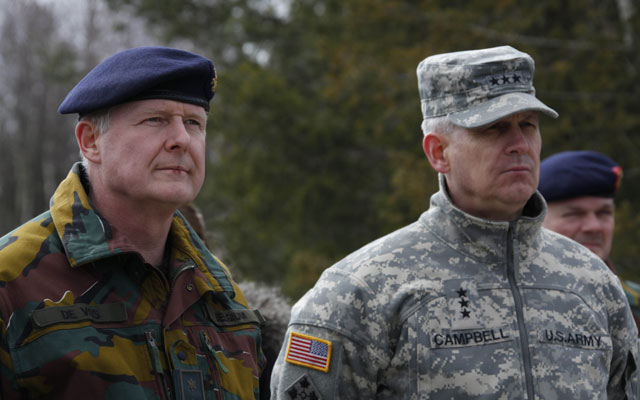The Army could shrink to its lowest active-duty end strength size since before World War II, according to recent statements by military officials.
Over the past two weeks Army leadership has hinted at a new strategic direction of fewer troops and lighter, more mobile weapons. However, this “strategy” is merely the Army’s attempt to make the best of the budget reductions imposed by the Obama Administration they now face.
The Army plans to increase the use of unmanned ground and air vehicles in an effort to make up for expected troop reductions. According to Military Times, another way the service is trying to balance its force structure is “a proposal to pull all of the Apache attack helicopters out of the National Guard and hand them over to the active component (giving the Guard Black Hawks in return).”
All of this is supposed to result in an Army that is able to get into tighter, less available regions, or as the military often says, “do more with less.” History tells us that will not be the case.
After World War II, Korea, Vietnam, the Cold War, and Kuwait, plans were either scheduled or implemented to significantly reduce the size of the military. In each of these cases, the U.S. inevitably had to rapidly reconstitute its forces. Military readiness expert and retired Army colonel Richard Dunn explains:
[T]he Great Depression and isolationism made military preparedness a very low national priority. Despite the threatening war clouds rapidly expanding in Asia and Europe, the U.S. was woefully unprepared for global conflict. The shock of Pearl Harbor mobilized both the industrial capability and the moral determination to overcome the early, disastrous reversals in the Pacific and tactical defeats in North Africa.
Although America was eventually successful in World War II, those drawdowns cost much in terms of blood and treasure because the military had to send many men into combat improperly trained or equipped, a result of America’s failure to consistently commit to a strong national security posture. Current defense cuts could lead us down a similar path.
War is something that is tragic, ugly, and sometimes spontaneous, but rarely predicted and never planned. The responsible path forward isn’t gutting defense for short-lived political gain. Rather, it involves maintaining a strong national defense. This will ensure that the men and women who serve in the U.S. military will remain the most professional and overpowering force the world has ever seen. Our Constitution requires it and our security depends on it.
Richard Moxley is currently a member of the Young Leaders Program at The Heritage Foundation. For more information on interning at Heritage, please click here.
